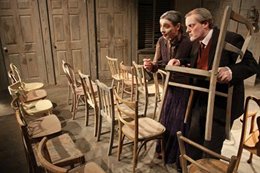Never have the members of an audience wreaked as much havoc in the theatre - pushing and shoving their way to their seats, trotting on the toes of the elderly, even going as far as calling the lady selling programmes and Eskimo pies a cow. Invisible they may be, but the gathering of society’s most colourful intellectuals and proprietors before us, including the violinists, the chemists, the cabinet-makers, the miners, bankers and designers - even his Majesty (“Jesty”), the Emperor himself - makes for a wonderfully anarchic and engaging occasion of eloquent and frequently poetic absurdity.
Bathed in a hue of broken blue-grey light, Old Man (John Carty) and his ninety-four year old wife-come-mother, Sémiramis (Sandra O’Malley), pass the slow grind of time in their desolate dwelling (whether a house, lighthouse, asylum, or the interior of a troubled mind, is unclear and, moreover, irrelevant) by telling the same half-forgotten stories and impersonating the months of the year. February, for example, is a comic head-scratch à la Stan Laurel.
When Old Woman’s talk of what should have been (and what Old Man could have become had he a little ambition in life) eventually reduces her underachieving ninety-five year old husband to a torrent of tears and yowls for his mama, he is at once overcome with an overwhelming urge to make something of himself before his departure from the world, and, egged on by his devoted and equally embittered wife, his plan to divulge a momentous life-affirming message to humanity transpires.
 Gradually, the guests invisibly appear in ever-increasing numbers until Old Woman is thrashing in and out of doors with chairs like a puppet among the throngs, and Old Man introduces, reintroduces, responds, rebukes, reacts, nods, bows and shakes the hands of his oncoming addressees with rapid and panic-stricken hospitality. All the while, the proliferation of empty wooden chairs encroaches on the stage, separating the couple against either side of the mouldering walls until their voices, calling out across the mayhem, are all that remains of one another. All hell, it appears, has broken loose.
Gradually, the guests invisibly appear in ever-increasing numbers until Old Woman is thrashing in and out of doors with chairs like a puppet among the throngs, and Old Man introduces, reintroduces, responds, rebukes, reacts, nods, bows and shakes the hands of his oncoming addressees with rapid and panic-stricken hospitality. All the while, the proliferation of empty wooden chairs encroaches on the stage, separating the couple against either side of the mouldering walls until their voices, calling out across the mayhem, are all that remains of one another. All hell, it appears, has broken loose.
And then the ‘Orator’ (Ciarán McCauley) arrives (but actually arrives), employed by Old Man (due to an admitted difficulty with self-expression) to bequeath his message to the world. After a lengthy and highly expressive introduction by Old Man, the Orator is entrusted to reveal all, and the couple dive from each window in synchrony to their death (for they wish to die as one together). What it 'all' actually is should and will remain a mystery.
The initial sense of isolation, austerity and decay in the piece is underscored brilliantly by the vacant red-eyed stares of the century-old couple and their effective long silences during the opening moments, allowing the arid hum of the surrounding waterbugs to engulf us. In the wake of the carefully choreographed hysteria that is to erupt in one great big crescendo thereafter, the gradual acceleration of pace in the play is very clearly executed by director Niall Henry. From how tediously slowly the first door is opened to the song of its own long chromatic creak, to the flapping and banging of all seven doors at full speed while the doorbell hammers out an impatient atonal ring, the lunacy of the situation is so measured and seamless in its progression that there is nothing in the least bit absurd about it.
A notably challenging and loquacious text, both Carty and O’Malley delivered each line with pitch-perfect dexterity. Adopting an appropriately caricatured form, both interacted with the play’s invisibilities with complete conviction, never once losing sight of anything or anyone throughout the frenzied scenes. Joe Hunt’s sound design provided just the right amount of aural torment with the rumble of approaching engines set ever so slightly too loud, and the ascending modulation of the doorbell made for a subtle but hilarious touch in the soundtrack to the climax of the play.
On the whole, this florid swansong of an old couple is dark, dour, quite funny and deeply philosophical. The uniqueness of Ionesco's tragic farce lies in how vividly present the absences seem, how the voices clearly resound in the silences, and how alarmingly chaotic an otherwise empty set can become through the power of our own imaginations and the utter conviction of the three performers.
Jennifer Lee holds an MPhil in Theatre and Performance and is currently completing her PhD thesis.